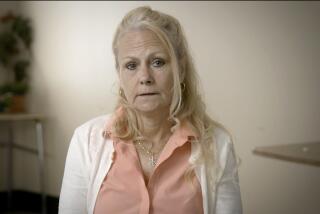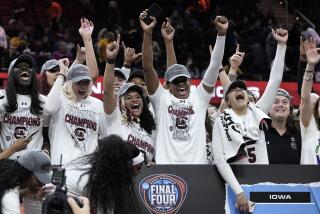A Perfect Spot for a Cajun Cager
- Share via
NEW ORLEANS — Of all the gym joints in all the world, he had to walk into this one. The Louisiana Superdome. Sixty miles from his hometown of Baton Rouge. Sixty miles from the McDonald’s fast-food joint where as a wimpy high school junior he worked, in his own words, as “a hamburger flipper.” Now, four years later, here he was--homecoming king.
Keith Smart, Cajun cager.
There is only so far a human being can throw a basketball--it would take Superman in the Superdome to fling one from the gymnasium floor to the Bob Uecker nosebleed section up top--but this skinny 6-foot 1-inch Indiana University player gave it the old college try Monday night, hurling the game ball as high and as far as humanly possible after making the last shot in Indiana’s 74-73 win over Syracuse for the national championship.
He wished he could have thrown it to the most-distant seats, where some of the 64,959 spectators must have been watching the NCAA tournament’s thrilling conclusion with help from binoculars, telescopes and occasional messages strapped to the legs of pigeons. Up there, in the arena’s outer limits, was where as a 9-year-old Boy Scout, itty-bitty Keith Smart once felt privileged to work as an usher.
How he yearned to play big-time basketball some day, for Louisiana State, for Tulane, for the University of New Orleans, for anybody down by the Bayou. But nobody needed a 5-3 burger flipper. “Even the guy sweeping up got into the game before me,” Smart remembered. Nor did any college coach come calling even when he grew to 5-7 by his senior year and started to play a little better. The only letter from a college that came to his house was from the nice folks at William Penn College in Oskaloosa, Iowa, where the NCAA basketball tournament is not much more than a popular CBS television show.
Smart wasn’t sure what he should do--but he knew he didn’t care to do it there . And then even William Penn withdrew its invitation when little Keith fell off a motorcycle and broke his left wrist. When an acquaintance eventually suggested a junior college in Garden City, Kan., Keith said OK, why not. He knew next to nothing about the place. Not even that it was near the Colorado border, or that a couple of murderous creeps named Dick and Perry once slaughtered a local family and eventually came to be written about in Truman Capote’s “In Cold Blood.”
Two years and a Junior College All-American award later, Keith Smart was contacted by an Indiana University assistant coach. Somebody else answered the phone, and Keith told him to hang up. Somebody is playing a joke, he said. Indiana doesn’t recruit JC players. Not even JC superstars. Bobby Knight wouldn’t be caught dead with a junior college player.
The caller eventually got through. Next thing Smart knew, he was a starting guard for the Hoosiers, dribbling alongside Steve Alford, the Indiana home boy with the yes-ma’am manners and the Steve Garvey no-muss hairdo and the juicy jump shot. Alford already was a statewide celebrity. The hoopin’ Hoosier. The kid with the better shooting percentage on three-point shots than on two-point shots. Little Stevie the wonder.
The coach was so smitten with Smart, in private he often spoke of how he couldn’t wait until next season, when Alford would be gone and he could turn the other guard loose. “Next season” was on Bob Knight’s mind a lot, particularly after his team lost the fourth game of the season to Vanderbilt, and won the next one over North Carolina Wilmington by a single point.
Suddenly, the Hoosiers got hot. Their only losses the rest of the season came to the Big Ten’s three toughest teams, Purdue, Iowa and Illinois. They earned a share of the conference championship. And they scrapped their way through round after round of the NCAA tournament, until finally a one-point win over LSU, Keith Smart’s hometown school, bought passage for the Indiana team to New Orleans, Smart’s home away from home.
Everybody back in the Bayou was happy. His mother had only been able to go to one of his college games, against Ohio State, and for her trouble saw her son hyperventilate and have to be taken out. Keith’s father had never been to one of his college games. Herbert Smart used to drive his little Boy Scout to the Superdome, but he never realized how seriously Keith took it when he heard the Scout motto: Be prepared.
It thrilled the Smarts to be part of the audience Saturday when their son helped Indiana eliminate the No. 1 team in the nation, Nevada Las Vegas, and again Monday when he flipped--ever the flipper--a 16-foot jump shot into the hoop with four seconds remaining to wipe out Syracuse’s 73-72 lead. They were still cheering when the rest of those seconds ticked away and Keith heaved the ball into the stands.
The beauty of the game-winning shot, and what should be remembered in years to come, was that unlike Michael Jordan’s game-winner for North Carolina in 1982 or Lorenzo Charles’ last-second dunk for North Carolina State in 1983, Smart’s team wasn’t tied on the scoreboard. It was behind . If he misses, his team loses.
Smart didn’t miss. “I couldn’t dream this,” he said later. “I couldn’t dream this and believe it the next day.”
There he was, the little Superdome usher, at center stage of the arena instead of in the balcony. Waving a giant IU flag. Blowing kisses to the crowd. Roosting on teammates’ shoulders. Laughing at the little poem that assistant coach Ron Felling had thought up and sprung on the players in the middle of their on-the-floor celebration. It went like this:
“The Runnin’ Rebels are home walkin’ .
“The Orangemen have now turned blue.
“Because the Hoosiers won the championship.
“Down on the old Bayou.”
Indiana’s greatest poetry Monday was Alford and Smart in motion. One guard kept the team in the game for a half by setting his feet and shooting. The other guard took control of the game for the other half by shooting on the move. Smart scored 12 of the champions’ last 15 points. “We call him Ice, and he showed why tonight,” teammate Joe Hillman said.
Hillman, too, helped out, working as part of IU’s three-guard attack. He wasn’t free to shoot the way he was when he averaged 41.3 points a game at Hoover High in Glendale. But shooting isn’t everything. “Hillman made a definite contribution to our winning the championship, a big one,” said Knight.
For a moment, it looked as though Hillman might have to take the last shot. Alford couldn’t get free. Then, Daryl Thomas got the ball. He looked. He hesitated. He got it to Smart. “I’d like to thank Daryl for not taking the shot and for getting the ball to me,” said the conquering hero. “That was a wise decision on his part.”
OK, OK, here it comes. The inevitable player-of-the-game play-on-the-name:
A Smart decision on his part.
Had Smart ever made such a momentous shot before? “Only in pickup games,” he said. Certainly not in the Superdome, where, in ‘82, Jordan made his title-winner from exactly the same corner of the arena, wearing Smart’s same jersey number (23). “How about that?” Smart said later, happily amazed.
He had wanted to do something spectacular so badly that he actually tried too hard in the first half. Surprising that he didn’t hyperventilate again. Knight practically leaped to his feet after one reckless pass and removed Smart from the game, although he did so with a friendly pat on the rump. According to Smart: “He just wanted to settle me down a little, let me collect my thoughts.”
He turned to the coach and smiled.
“I thank you for putting me back in,” he said.
Forever and ever, he would remember it all. Making the last basket. Catching Syracuse’s last-second desperation shot. Throwing the ball. Riding off on everyone’s shoulders. Him, Keith Smart. The Boy Scout. The burger king. King Creole.
“I do. I do feel like a king,” he said.
Son of a gun, he had big fun, on the Bayou.
More to Read
Go beyond the scoreboard
Get the latest on L.A.'s teams in the daily Sports Report newsletter.
You may occasionally receive promotional content from the Los Angeles Times.










